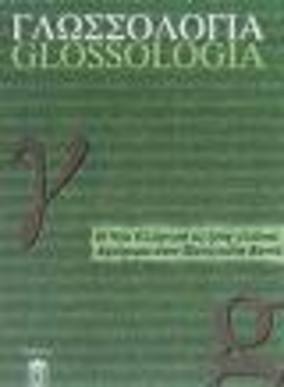Χαρακτηριστικά του δημόσιου λόγου σε απεικονίσεις της οικονομικής κρίσης στην Ελλάδα
Part of : Γλωσσολογία ; Vol.21, 2013, pages 39-55
Issue:
Pages:
39-55
Author:
Abstract:
This paper investigates the use of language structures and language functions in the representation of the economic crisis plaguing Greece after the so-called Memorandum of Understanding. The analysis refers to traditional and contemporary journalistic issues and follows a Critical Discourse Analysis approach. As previously noted, the Greek economic crisis and its negative effects are reflected through noun and verbal structures. The choice between structures is due to the different communicative intentions of the journalistic texts designers and producers. People are either presented as experiencing the painful crisis as "victims" or, in other cases, the language function is distant and mainly descriptive. Generally, the language representation of the crisis refers to a personalized subject, concerning and threatening all Greek society rather than a single part of it. Finally, where a description of the crisis effects is required, there is use of vernacular, whereas in order to present the supposedly suitable solutions for the crisis, a more cultured variety is used, aiming at social recognition.
Subject (LC):
Keywords:
γλωσσικές απεικονίσεις, γλωσσικές λειτουργίες, κοινωνικές ποικιλίες, Κριτική Ανάλυση Λόγου
Notes:
Περιέχει σημειώσεις, παράρτημα και βιβλιογραφία
References (1):
- Αρχάκης, Α. & Τσάκωνα, Β. 2008. Αναλύοντας την κοινοβουλευτική ειδησεογραφία στις ελληνικέςεφηµερίδες. Στο Π. Πολίτης (επιµ.), Ο λόγος της µαζικής επικοινωνίας. Το ελληνικό παράδειγµα.Θεσσαλονίκη: Ινστιτούτο Νεοελληνικών Σπουδών-Ίδρυµα Μανόλη Τριανταφυλλίδη, 25-29.Allan, K. & Burridge, K. 2006. Forbidden Words: Taboo and the Censoring of Language. Cambridge:Cambridge University Press.Βαλιούλη, Μ. 2001. Υπερβολές, αυθαιρεσίες και νοηµατικές εκπτώσεις. Εφαρµοσµένη Γλωσσολογία17, 9-25.Bagnall, N. 1993. Newspaper Language. Oxford: Focal Press.Bamberg, M. 1997. Emotion talk(s): The role of perspective in the construction of emotions. In S.Niemeier & R. Dirven (eds), The Language of Emotions. Amsterdam/Philadelphia: JohnBenjamins, 209-225.Γεωργακοπούλου, Α. & Γούτσος, ∆. 1999. Κείµενο και επικοινωνία. Αθήνα: Ελληνικά Γράµµατα.Γούτσος, ∆. 2009. Λεξικά συµπλέγµατα και στερεοτυπία στο δηµοσιογραφικό λόγο. ΖητήµαταΕπικοινωνίας 9, 75-89.Cummins, J. 2002. Ταυτότητες υπό διαπραγµάτευση. (Μτφρ. Σ. Αργύρη). Αθήνα: Gutenberg.De Beaugrande, R. 2001. Large corpora, small corpora, and the learning of language. In M. Ghadessy,A. Henry & R. L. Roseberry (eds), Small Corpus Studies and ELT. Amsterdam/Philadelphia:John Benjamins, 3-28.Deignan, A. 1999a. Corpus-based research into metaphor. In L. Cameron & G. Low (eds),Researching and Applying Metaphor. Cambridge: Cambridge University Press, 177-199.Deignan, A. 1999b. Linguistic metaphors and collocation in non-literary corpus data. Metaphor andSymbol 14 (1), 19-36.Deignan, A. 2005. Metaphor and Corpus Linguistics. Amsterdam/Philadelphia: John Benjamins.Fairclough, N. 1995. Critical Discourse Analysis: The Critical Study of Language. London: Longman.Fairclough, N. 2003. Analysing Discourse. London/New York: Routledge.Gilmor, D. 2004. We the Media: Grassroots Journalism by the People for the People. Sebastopol: O’Reilly Media.Gwyn, R. 1999. Captain of my own ship: Metaphor and the discourse of chronic illness. In L.Cameron & G. Low (eds), Researching and Applying Metaphor. Cambridge: CambridgeUniversity Press, 203-220. Κουτσουλέλου-Μίχου, Σ. 1997. Η γλώσσα της διαφήµισης. Κειµενογλωσσολογική προσέγγιση τουδιαφηµιστικού κειµένου. Αθήνα: Gutenberg.Κωστούλα-Μακράκη, N. 2001. Γλώσσα και κοινωνία. Βασικές έννοιες. Αθήνα: Μεταίχµιο.Λασκαράτου, Χ. 2012. Η λειτουργία της γλώσσας στη βιωµατική εµπειρία του πόνου σε διαλόγουςθεραπευτών-ασθενών. Στο Ν. Τσιτσανούδη-Μαλλίδη (επιµ.), Η διαχείριση του πόνου στηδηµόσια σφαίρα. Από τη νηπιακή ηλικία µέχρι και την ενηλικίωση. Αθήνα: Προποµπός, 17-39.Lascaratou, C. 2008. The function of language in the experience of pain. In C. Lascaratou, A.Despotopoulou & E. Ifantidou (eds), Reconstructing Pain and Joy: Linguistic, Literary, andCultural Perspectives. Newcastle: Cambridge Scholars Publishing, 35-57.Lascaratou, C. & Marmaridou, S. 2005. Metaphor in Greek pain constructions: Cognitive andfunctional perspectives. In S. Marmaridou, K. Nikiforidou & E. Antonopoulou (eds), ReviewingLinguistic Thought: Converging Trends for the 21st Century. Berlin: Mouton de Gruyter, 235-254.Λεξικό της Κοινής Νεοελληνικής. 1998. Θεσσαλονίκη: Ινστιτούτο Νεοελληνικών Σπουδών-ΊδρυµαΜανόλη Τριανταφυλλίδη.Μήτσης, Ν. 1999. ∆ιδακτική του γλωσσικού µαθήµατος. Από τη γλωσσική θεωρία στη διδακτική πράξη.Αθήνα: Gutenberg.Μήτσης, Ν. 2004. Η διδασκαλία της γλώσσας υπό το πρίσµα της επικοινωνιακής προσέγγισης. Αθήνα:Gutenberg.Μπακάκου-Ορφανού, Α. 2008. Προφορικότητα και πολιτικός λόγος. Στο Α. Μόζερ, Α. Μπακάκου-Ορφανού, Χ. Χαραλαµπάκης & ∆. Χειλά-Μαρκοπούλου (επιµ.), Γλώσσης χάριν. Τόµοςαφιερωµένος από τον Τοµέα Γλωσσολογίας στον καθηγητή Γεώργιο Μπαµπινιώτη. Αθήνα:Ελληνικά Γράµµατα, 389-401.Νάκας, Α. & Γαβριηλίδου, Ζ. (2005). ∆ηµοσιογραφία και νεολογία: Τίτλοι-ευρήµατα για θέµατα-εκπλήξεις. Αθήνα: Πατάκης.Πολίτης, Π. 2009. Εννοιακές µεταφορές και λεξικές συµπαραθέσεις σε τηλεοπτικά δελτία ειδήσεων.Ζητήµατα Επικοινωνίας 9, 90-101.Pavlenko, A. 2002. Emotions and the body in Russian and English. Pragmatics and Cognition 10 (12),207-241. Semino, E., Heywood, J. & Short, M. 2004. Methodological problems in the analysis of metaphors ina corpus of conversations about cancer. Journal of Pragmatics 36, 1271-1294.Sinclair, J. M. 1991. Corpus, Concordance, Collocation. Oxford: Oxford University Press.Sontag, S. 1991. Illness as Metaphor: AIDS and its Metaphors. London: Penguin.Τριανταφυλλίδης, Μ. 1963. Άπαντα Μανόλη Τριανταφυλλίδη. Γλωσσικό ζήτηµα καιγλωσσοεκπαιδευτικά Β. Ινστιτούτο Νεοελληνικών Σπουδών-Ίδρυµα Μανόλη Τριανταφυλλίδη.Τσιτσανούδη-Μαλλίδη, Ν. 2006. Η λαϊκή γλώσσα των ειδήσεων. Μια στάση απατηλής οικειότητας.Αθήνα: Εµπειρία Εκδοτική.Tsakona, V. 2009. Linguistic creativity, secondary orality, and political discourse: The Modern Greekmyth of the “eloquent orator”. Journal of Modern Greek Studies 27 (1), 81-106.Tsitsanoudis-Mallidis, N. 2011. The transformation of television journalistic discourse into an objectof commercial dealing. The Greek case. International Journal of Instructional Media 38 (2),133-146.Φραγκουδάκη, Α. 1999. Γλώσσα και ιδεολογία. Αθήνα: Οδυσσέας.Χατζησαββίδης, Σ. 2000. Ελληνική γλώσσα και δηµοσιογραφικός λόγος. Θεωρητικές και ερµηνευτικέςπροσεγγίσεις. Αθήνα: Gutenberg.Wittgenstein, L. 1953/1989. Philosophical Investigations. Oxford: Blackwell.




